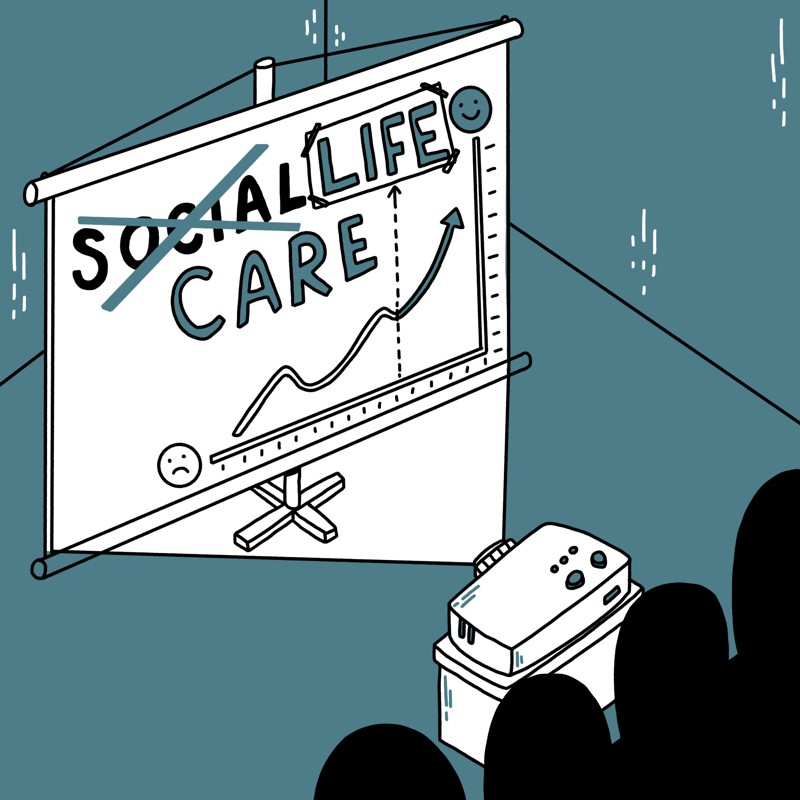
The definition and ethos of Social Care
What is Social Care? As providers, we have a good understanding of what we do. We support elderly residents to enjoy their last years with compassion and joy. We provide vital care at home following a stay in hospital. We maintain the independence and comfort for people wishing to stay in their own home. We provide people with learning disabilities with a safe place to live and support to enjoy progressive, enriched and independent lives in the community. The common factor is that we are enabling people to live rich lives of real purpose.
But most people only learn about Social Care when they or their loved ones need to call on it. We would like people to have a greater understanding of Social Care. More than that, we would like people to hold Social Care in the same high regard and affection that they do the NHS.
Social Care should be founded on a strong ethos and exemplary values. In every interaction with the Social Care system people should be assured that they will be listened to and treated with dignity and respect.
We need to be clear about the Social Care brand identity (branding is important and demands attention) and ensure that we have the mechanisms to promote it. It is not enough for Social Care services to be outstanding – they also need to be seen to be outstanding.
Current Issues & Problems
System. The ‘social care system’ such as it is, is one that has evolved piecemeal over the last 70 years, often in response to particular historic circumstances and events, but certainly not by a modern design, fit for the future (or even the present).
Aims and Definition. Further, what ‘Social Care’ represents, is not driven by a modern central vision of what it should or could do to meet the needs, wants or expectation of our current generation.
Perception. There is a deficiency and disconnect between what Social Care actually delivers through its providers and what people believe it delivers (or more pertinently is felt that it does not deliver).
Modern generation. There is the significant challenge that the needs, wants and expectation of the modern generation are fundamentally different (and more demanding) than previous generations, yet centrally, successive Governments have avoided developing any modern strategic plans and direction to address this.
Dysfunctional infrastructure. The infrastructure is multi layered, dysfunctional and tense, with overarching legislative and funding decisions made centrally, with practical implementation devolved locally across either Social Services and or the Health systems,(working to different ‘drivers’ with multiple tensions between different sections (financial, cultural and aspirational) whilst operationally Service provision is delivered by Providers answerable to the people using services and simultaneously.
Dysfunctional system culture. In the absence of a clear overarching strategy, with a general lack of ambition and vision, and the prevailing but dichotomous cultures, values and ambitions of its constituent parts, it is the person using a service who can be failed either at the outset of engagement with the Health and Care system, or in navigating between constituent parts of the system.
Ethos. The system as a whole fails in multiple ways to meet the reasonable needs, wants and ambitions of the modern generation, let alone future generations. What it represents, can and does achieve, often becomes blurred in a medicalised, bureaucratic and sometimes overly negative narrative
Our Proposal
Ethos. We wish to see the ethos of Social Care defined and agreed by all stakeholders. Our view is that the sector and system must be supported to serve, put others first (above self, organisation or segment) and adopt a relentless focus on improving quality of life, progression, fulfilment, purpose and meaningful individual occupation.
Aims and definition. We wish to see a Social Care system which embraces the ambitions of our entire population overall, accommodates the subjectively chosen ambitions of its members and is underpinned the principles of exemplary human inter personal behaviour, for example effective listening, behavioural congruence, acceptance and appreciation.
The structure and system. A radical re design of the ‘system’ would embrace an effective integration of its constituent parts driven by a consultative futuristic vision for the modern era, driven by the aims, ambitions and values of its accessing members. Its defining principles would truly embrace collaboration or partnership working, be driven by unconditional service to and empowerment of its members, and adjudged by the standard of what we would wish ourselves today. We comment further and make specific proposals on the ‘Structure and Integration’ page.
Public perception. Social Care can only flourish with pubic support. We wish to promote, acknowledge, celebrate and embrace the developing positive reality of modern Social Care, and not tolerate the prevalence of negative, discriminatory or prejudicial attributes. To achieve this we wish to see the Social Care brand promoted and celebrated.
Modern generation. We wish to celebrate the extraordinary growth in longevity, and recognise the fundamental rise in expectation as generations succeed and deploy a futuristic ambition.
Infrastructure and culture. Component members of the entire Health and Care system and its stakeholders can adopt and embrace principles of empowerment (e.g. effective listening and response) collaboration and partnership (working to agreed common goals and ambitions with an empowering focus on modern leadership (reflection, learning and innovation)
Commentary on ‘People At The Heart Of Care’: The Adult Social Care Reform White Paper (published 01/12/21)
text here
Best Practice Share
To be added
Our Key Takeaways
text here
